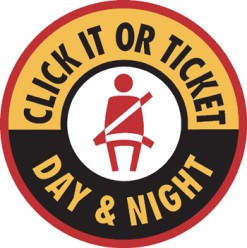 Later this month, the La Porte Police Department will join law-enforcement agencies across Indiana and the nation to increase enforcement of seat-belt laws for Click It or Ticket. Multiple weeks of high-visibility patrols will be watching for unrestrained passengers in cars and trucks, both children and adults, the front seat and back, both day and night.
Later this month, the La Porte Police Department will join law-enforcement agencies across Indiana and the nation to increase enforcement of seat-belt laws for Click It or Ticket. Multiple weeks of high-visibility patrols will be watching for unrestrained passengers in cars and trucks, both children and adults, the front seat and back, both day and night.
Click It or Ticket continues through the start of the summer travel season, including the Memorial Day holiday. Overtime police patrols are paid with National Highway Traffic Safety Administration funds administered by the Indiana Criminal Justice Institute (ICJI).
2018 marks 30 years since Indiana’s seat-belt law began. Since that time, Indiana – along with 34 other states – has enacted a primary seat-belt law, meaning that police can pull you over for being unbuckled.
Indiana has participated in Click It or Ticket for more than 20 years. Last year, more than 240 law-enforcement agencies performed 8,728 hours of traffic patrols and issued more than 30,000 citations or warnings, of which about 13,700 were seat-belt and child-restraint citations.
“Click It or Ticket means zero-tolerance for unrestrained drivers and passengers,” said Captain Pat Hemphill. “So why are we warning everyone in advance? Because the bottom line is not issuing seat-belt citations, but saving lives. Anyone who responds to a serious crash just wants motorists to buckle up in the first place.”
Don’t be a statistic
There are TV shows and podcasts about violent crime investigations, but first responders actually see more traffic crashes. You are more likely to have property damage, be injured or killed in a traffic crash than be a victim of burglary, violent crime or murder, respectively
From 2000 to 2017, the Purdue University Center for Road Safety says that seat-belt usage increased from 62 to 93 percent, beating the most recent national average of 90.1 percent. Indiana has made great progress through stronger laws and highly-visible enforcement, but the small percentage who still don’t buckle up make up nearly half of those killed on our roadways.
In 2016, there were 10,428 unbuckled motorists killed in crashes in the United States. Seat belts were estimated to save an additional 14,668 lives.
Pickup trucks and SUVs feel safer because they are larger and sit higher to the road. But don’t let that lure you into a false sense of security! Motorists in pickup trucks are over-represented in unrestrained injuries and deaths.
ICJI partners with the Indiana University Public Policy Institute to analyze seat-belt statistics. The latest information is at www.in.gov/cji/files/Highway_Safety_Occupant_Protection_2016.pdf. National statistics are at www.nhtsa.gov/risky-driving/seat-belts.
Seat-belt tips
What is the best way to reduce your chances of injury or death? Buckle up! Below are tips for proper seat-belt use:
- Secure the lap belt across your hips and pelvis, below your stomach.
- Place the shoulder belt across the middle of your chest and rib cage, away from your neck.
- Never put the shoulder belt behind your back or under an arm.
- If your seat belt doesn’t fit you, or you have an older car with lap belts only, ask your dealer or vehicle manufacturer about seat-belt adjusters, extenders or retrofits.
Buckle who you love
Have a friend or family member who doesn’t buckle up? Speak up! One life lost is too many, so don’t leave any of your loved ones behind.
Have friends or family that are men under age 45? They are majority of those killed, because they don’t take 3 seconds to buckle up.
Don’t just buckle up for yourself, do it for the kids. During a crash, unrestrained passengers can become projectiles that injure or kill others in the car.
In Indiana, unrestrained children under 16 are the driver’s responsibility. Adults set the example, and parents who don’t buckle up are more likely to have unbuckled kids. That means one ticket for you and one for each unrestrained child.
Traffic crashes are the leading killer of children ages 1 to 13. Indiana requires all children age 8 and under to be in an approved car seat or booster seat, but as children get older, they are less likely to remain buckled.
Choose the safest car seat for your child’s height and weight at www.safercar.gov/therightseat. Find a certified car-seat safety technician to assist with installation at www.preventinjury.org/Child-Passenger-Safety/Child-Safety-Seat-Inspection-Stations or through the SaferCar app on iTunes or Google Play.